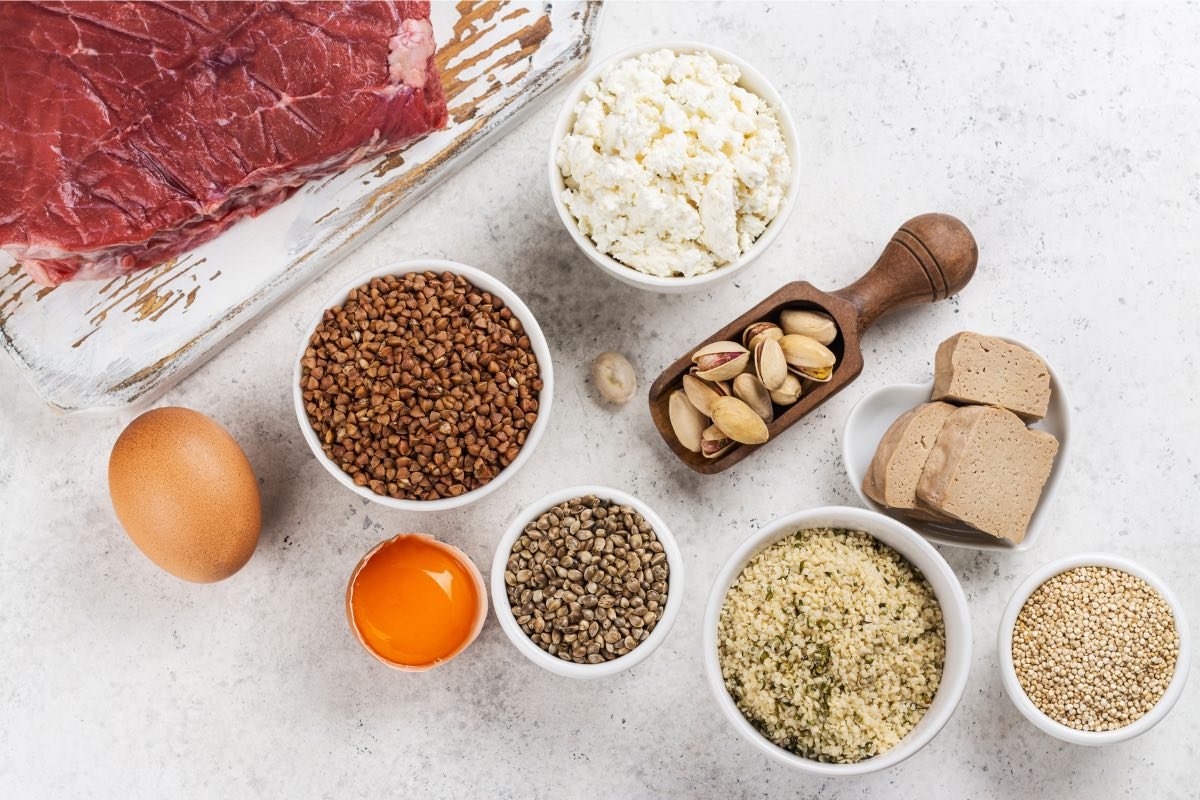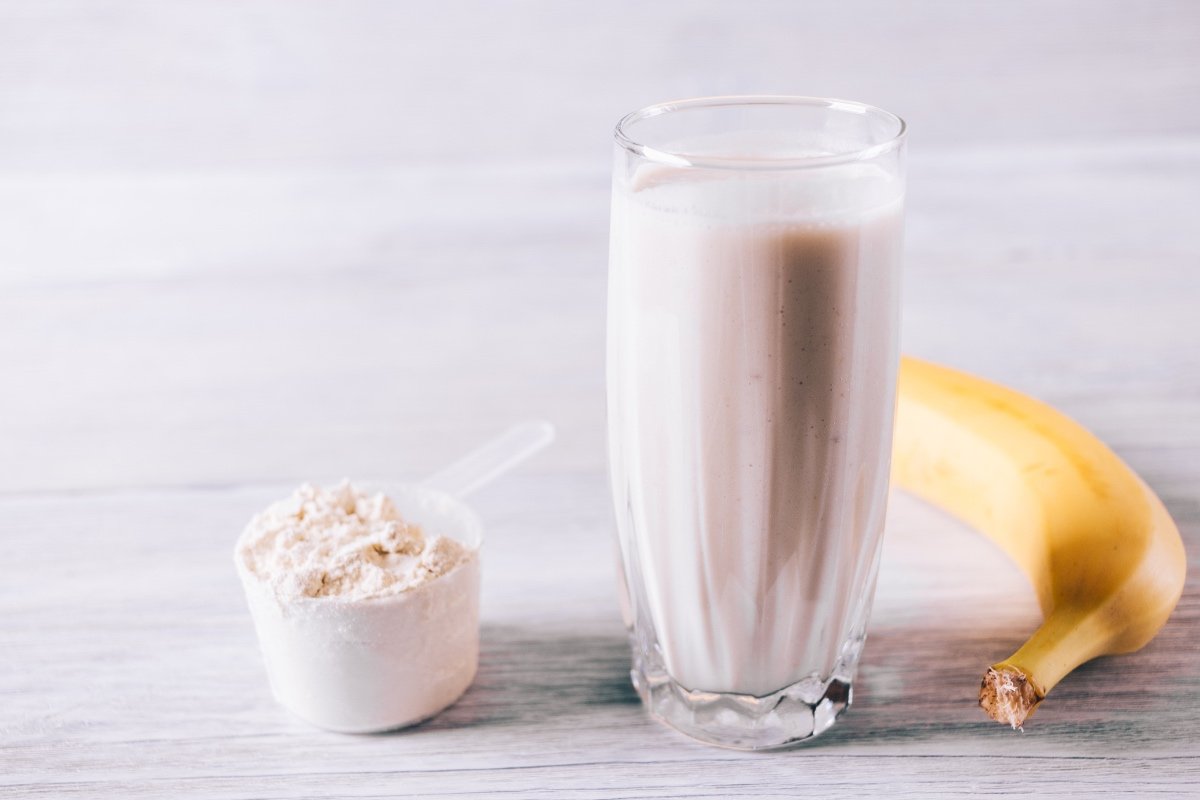Are Protein Powders Safe While Breastfeeding?
They’re quick, tasty and one of the most convenient sources of protein, so it’s no surprise protein shakes and powders are popular among postpartum mums.
But are protein powders safe while breastfeeding?
The answer is yes, in most cases, but there are a few things to keep in mind when deciding whether a protein powder is right for you.
Here’s what you need to know about protein powders and protein shakes while breastfeeding.
How much protein is needed during breastfeeding?
Protein is needed for tissue repair postpartum and is also an important component of breastmilk, so protein needs naturally increase while breastfeeding.
But the amount of protein needed postpartum is fairly easy to achieve, particularly when you’re likely to be feeling more hungry and eating more than usual.
The recommended daily intake of protein during breastfeeding is 67g/day or 1.1g/kg of body weight.
Given that 100g of cooked chicken has around 30g of protein, a glass of milk around 8g of protein and a slice of wholegrain bread has 4-5g of protein, most postpartum mums will reach this amount without even trying.
Amount of protein in common foods and drinks:
Milk – 8g per 250ml cup
Yoghurt – 7g per 1/2 cup
Cheese – 6g per slice (25g slice)
Meat, poultry and fish – ~25g per 100g (raw weight)
Eggs – 6g per egg
Pasta (white or whole wheat) – 8g per cup (cooked)
Wholegrain bread – 4-6g per slice (white bread is around 2g per slice)
Bean & legumes (such as chickpeas, lentils, kidney beans and green peas) – 6g per 1/2 cup (cooked)
Seeds (such as chia seeds and sesame seeds) – 3g per tablespoon
Tofu – 8g per 100g
Nut butter – 5g per tablespoon
Oats - 3.5g per 30g serve (uncooked)
Protein powder - 20-25g per 30g scoop
The best sources of protein for breastfeeding
While protein powders are a convenient source of protein, there are plenty of other ways to get the protein you need.
Whole food protein sources offer a range of other nutrients, so they’re generally a more nutritious option than protein powders which only offer protein.
Nutritious, protein-rich foods for breastfeeding include meat, chicken, fish, eggs, dairy foods such as milk and yoghurt (full fat or reduced fat), legumes, tofu, nuts and seeds.
Benefits of protein powders while breastfeeding
While protein powders and shakes are far from essential while breastfeeding, they do offer some benefits, such as:
An easy way to top up your protein intake
When you need more protein than usual, protein shakes and powders can be an easy way to boost your intake. Protein shakes can bump up your fluid intake too.
Can help build muscle
If you’ve started working out again and you’re looking to build some muscle, protein supplements such as shakes and powders can help provide the additional protein you need.
A convenient snack option
When you don’t have the time or energy to prepare nutritious meals and snacks, protein shakes can offer a convenient and filling snack option.
You can also drink them one-handed, which counts for a lot when you’re breastfeeding!
If you’re having protein shakes as a snack, check out the ideas at the end of this article about how to bump up their nutritional value.
Check out my article 25 Nourishing Postpartum Snacks for more snack ideas.
How much protein is too much?
Most research suggests that up to 2g of protein per kilogram of body weight is safe for most healthy adults. However, chronic high intake of protein (more than 2g per kg body weight) can cause health issues and should be avoided.
What about heavy metals in protein powder?
There have been reports recently of protein powders containing high levels of heavy metals such as arsenic, cadmium, mercury and lead.
While this sounds scary, further research found that a typical intake of protein powders wouldn’t result in adverse health effects due to heavy metals.
Whey protein powder was found to have lower levels of heavy metals compared to plant-derived protein powder, so that may be a better option if you’re concerned about exposure to heavy metals.
And if you really don’t want to risk it, you can of course opt to get your protein from other sources.
Can protein powders boost milk supply?
Contrary to popular belief, there’s limited evidence that certain foods and drinks boost milk supply.
If they do, it’s likely due to the extra calories, nutrients and potentially fluid they add to the diet which results in an improved milk supply.
Downsides of protein powders while breastfeeding
Expensive
Per gram of protein, protein powders can be a lot more expensive than other sources.
So if you’re on a tight budget, you may want to look at getting your protein elsewhere.
Having said that, it pays to shop around as the price of protein powders can vary a lot.
Can add excess calories
If you’re having protein shakes on top of your meals and snacks, this will add additional calories to your diet which may mean that you’re consuming more calories than your body needs.
On the other hand, this might also be a good thing if you need a calorie top-up while breastfeeding!
Can contain not-so-great ingredients
Many protein powders contain a lot of sugar to make them taste good. They can also have additives such as artificial colours and flavours and artificial sweeteners and may even contain caffeine, which can cause issues while breastfeeding (although most protein powders are caffeine-free).
Whey vs plant-based protein powders
Among the many decisions to make about protein powders is whether to go for a whey protein powder or a plant-based one. So what’s the difference?
Most cow’s milk-based protein powders are made from whey, a milky liquid that’s a byproduct of cheese making.
As they’re made from cow’s milk, whey protein powders contain lactose (milk sugar), but the amount varies depending on how the protein powder is processed. Whey protein isolate typically contains less lactose than whey protein concentrate so may be a better option for people with lactose intolerance.
Plant-based protein powder is made from various types of plants, usually brown rice, pea, soy, hemp or a combination of these.
Because they’re made from plants, these protein powders don’t contain any dairy or lactose, making them a good option for vegans and people with lactose intolerance.
Whey and plant-based protein powders contain around the same amount of protein, generally around 20-30g per serve. But the type of protein differs between the two.
Whey protein powder is considered to be a complete protein, as it contains all nine essential amino acids, which are the building blocks of protein.
The protein content of plant-based protein powder depends on what plant it’s made from. Only soy protein powder is considered complete, with other types of plant-based protein powder missing one or more essential amino acids.
There’s also a difference between the two types in terms of their branched-chain amino acid content. BCAAs include leucine, isoleucine and valine which are important for muscle building. Plant-based powders typically contain fewer BCAAs than whey protein powders.
What to look for when choosing a protein powder
Once you’ve decided what type of protein powder to go for, you’ll still have a variety of options to choose from.
Some will be better than others and some might not be suitable while breastfeeding. Here are a few things to look for:
Low in sugar
Protein powders often contain large amounts of sugar to make them more palatable. Small amounts of sugar are fine, however, having too much sugar can increase the risk of excess weight gain and isn’t great for your teeth either.
Check the nutrition information panel on the product label and look for protein powders with less than 5g sugar per 100g or protein shakes with <2.5g sugar per 100ml.
Check for added micronutrients
Some protein powders have vitamins and minerals added to them to provide a broader range of nutrients. While for most people this is beneficial, it can be an issue for breastfeeding women who may be taking a postpartum supplement that contains these same vitamins and minerals.
Because having too much of certain micronutrients can be harmful, such as iron, zinc and vitamin A, it’s important to check for added micronutrients in your protein powder.
Avoid large amounts of caffeine
It’s generally safe to have some caffeine while breastfeeding, but if you or your baby are particularly sensitive to caffeine, you may want to give protein powders with added caffeine a miss.
However, it’s worth bearing in mind that most protein powders are caffeine-free.
Go easy on artificial sweeteners
Many protein powders contain artificial sweeteners instead of, or along with sugar. Moderate consumption of artificial sweeteners is generally considered safe for breastfeeding. But they offer no nutritional benefits and can encourage sugar cravings and a preference for sweet tastes, so they may be best avoided or at least limited.
How to make protein powder into a balanced snack
If you do choose to add protein powder to your diet, the best options are those with minimal added ingredients, such as plain whey protein powder.
Here are some ideas for using protein powders to make a nutritious balanced snack:
Add to smoothies with fruit (frozen berries, banana and mango are my favourites), milk and yoghurt
Stir through porridge or bircher muesli
Mix it through with yoghurt or cottage cheese for a delicious pudding
Add protein powder to protein balls and bliss balls
In most cases, moderate use of protein powders can be safe while breastfeeding, but make sure you check with your doctor before adding any supplements to your diet. And remember, protein powders and shakes are intended as a supplement to your diet, so make sure you’re basing your diet on whole foods as much as possible.
And finally, because we’re all different, it’s best to discuss your protein needs with a dietitian to make sure you’re getting the right amount for your own individual needs.









